- Home
- Madeleine L'engle
The Other Side of the Sun Page 6
The Other Side of the Sun Read online
Page 6
“He calls you Ron.”
“I imagine your father called his valet by his first name.”
“My father’s valet was not a doctor. I’m glad you and Terry like each other.”
“Why? What difference does that make?”
“I like you.”
He stood up on the rotting wood of the dock, towering over me. “But I don’t like, you, Mrs. Renier. Please let us get that straight. I have been back in Illyria for six months. You, too, are in Illyria now. You and I can have nothing in common.”
“Illyria?” I asked, getting to my feet. “Affection for Terry?”
“You must not allow me to be rude to you, Mrs. Renier.” He jumped to the sand, helped me down. “Good night.”
“Good night.”
He made me a courteous bow; set off rapidly for Illyria. I knew that I should follow him, that it was time for me to go back. Although the sky was still light, the fireflies were brightening. Night was hovering somewhere behind the dunes. Nevertheless I turned from Ron and walked farther up the beach.
And then night fell.
It came as Uncle Hoadley had warned me it would, like a clap of thunder. It had been light, a soft, pearly light, light enough for me to see Ron with ease. And then it was night. Utter and absolute. The fireflies blazed. From far out over the ocean a star pulsed. Then, on the very edge of the horizon where the darkness of water almost lost itself in the darkness of sky, I could see a faint, luminous glow, a red streak almost as though far out at sea there were fire. Then the redness began to have edges and the look of fire left and the upper circumference of a huge circle pushed itself out of the water, the color of blood.
I had never seen a moon look like this. It frightened me.
I walked along the edge of the water, comforting myself with one of Terry’s rhymes:
Clive and Honoria, Honoria and Clive,
Keep Illyria’s light alive.
They had a son whose name was Jim;
Jimmy married, and from him
Came Terence Ronald, known as Tron,
Then little Theron, nicknamed Ron.
I said it over, meaninglessly, several times, then began to wonder about Terence Ronald. Where was he?
As swiftly as night had come, the great sphere—it was nearly full—leapt from the sea, free of the horizon. The blood on the moon faded; it turned to burnished gold, seemed to take another leap up into the sky, and shone silver. It was, at last, the familiar moon I knew, the moon under which I had walked with my husband. Was it shining on him somewhere now?
I held my hands out to its light, as though to cool them. Then, aching for Terry, trying to hold back foolish, forlorn tears, I walked still farther up the beach.
Far ahead of me I saw two little figures dancing under the light of the moon, turning in slow, erratic circles. Up on the dunes warm yellow light came from a small cottage. The heat still bore down oppressively; I felt damp all over; and yet I was grateful for the comforting warmth of that light.
The two figures moved together, closer; then, circling still, began to play a clapping game.
The thought of children out playing on the beach reassured me, and I hurried toward them through the velvety tropical darkness.
“Pease porridge hot,” I heard them chanting, “pease porridge cold, pease porridge in the pot, nine days old.”
They were not children. They were little old men.
As I approached them in the increasing brilliance of the rising moon, I could see that they were no more than five feet tall, with laughing, wrinkled faces, white, softly curling hair, and white beards. They looked like something out of Grimm’s Fairy Tales.
“Ashes, ashes, and we all fall down!” one of them shouted suddenly, and they tumbled onto the sand. The moonlight emphasized their gnomishness, the soft silver of their hair.
I sighed with a kind of resigned terror.
They saw me, and suddenly they were running towards me, arms held out. They were so like children that I could not be frightened.
“Pretty lady! Pretty lady!” they cried, and came running along the sand to meet me, tumbling into my arms.
They were, I realized, the Illyrian equivalent of village idiots, affectionate and harmless. The middle-aged son of our elderly porter in Oxford was such an idiot and looked very much like these two little men, with the same wrinkled, vulnerable face and round eyes with an expression which combined innocence and an ancient, painful wisdom. He used to follow me around like a dog, and I was fond of him, and not in the least afraid.
“Miss—?” one of the little men inquired.
“Mrs. Renier,” I replied, still bemused by the joy of the new name.
“The new lady!” he cried. “The new lady at Illyria! Joy! Joy!” They joined hands and danced around me in glee. I could not help laughing.
They loosed hands, and one of them pointed, first to himself: “Willy.” Then to his brother: “Harry.”
“Hello, Willy.” I held my hands out to them. “Hello, Harry.”
They took my hands in theirs, warm and dry as tissue paper, bobbing and nodding their pleasure.
Willy pressed my hand, and his expression of happy welcome changed to one of anxiety. “Pretty lady, we don’t want Honoria and Clive to go away.”
“Don’t let them go away,” Harry whispered. “Away, no, no, no.”
I stood there in the moonlight, Willy holding on to my left hand, Harry to my right. “I don’t think Honoria and Clive are going anywhere.”
But they repeated, nodding their top-heavy heads, “Away, away.”
“Where did you get that idea?”
“We heard,” Willy said.
“Heard what?”
“Heard her.”
“Who’s her?”
“The Zenumin. Bad, bad, bad,” Willy said.
“We listen. Nobody knows. But we listen: we hear: we see. Dark and bad,” Harry said.
“What’s a Zenumin?” I asked.
“Her.”
“Where does she live, this Zenumin?”
Willie pointed up the beach and inland. “Back. In the scrub. The Bad Clearing.”
“Could I find her if I walked?”
The two little men got excited, both crying, “No, no, no! Don’t go find! Never. Never. Bad bad bad to take Honoria and Clive away.”
“Just Honoria and Clive? What about Aunt Olivia and Aunt Mary Desborough?”
“No, no, Honoria and Clive,” Willy said.
“Don’t let them,” Harry pleaded. “Stop it. Stop.”
I remembered how the porter’s idiot son sometimes got all excited and upset over nothing. I tried to comfort Willy and Harry. “I won’t let anyone take Honoria and Clive away.”
“Promise?”
“I promise.” I had the sense to add, “I’ll do my best.” I left the two little men and started back to Illyria.
5
The lights of the cottage disappeared behind a dune. Moonlight drenched the beach. The arm of the lightship swinging protectingly across the ocean was dimmed by the brilliance of the night.
“Ma’am!”
I stopped, looked around, saw only a shadow beside a palm tree atop a dune. The shadow moved, revealed itself to be a woman, tall, slender, graceful. She ran lightly down the dune, across the sand, and stood facing me. An odor came with her, an odd mingling of herbs and spices, neither pleasant nor unpleasant.
“Mrs. Renier?”
“Yes.”
She held her hands out to me, smiling. In the moonlight she was incredibly beautiful, and I understood for the first time that the freshness of youth cannot hope to compete with the beauty of maturity. I had no idea how old she was; I only knew that I was callow and unformed in comparison. I held my hand towards hers, but she drew me to her in a quick and unexpected embrace. I was both surprised and touched.
“Welcome,” she said. “Welcome. I am Belle.”
“Good evening.” I slid my hands out of hers. “I’m happy to meet you.
How did you know—”
“Everybody at the beach knowed the new Mrs. Renier was coming. Everybody know Belle Zenumin and her boys.”
“Except me,” I said. The moonlight touched her delicate features, glanced off her dark skin. The rising breeze whipped her skirts about her long thighs. Her skirts were considerably shorter than mine, and revealed her feet and ankles. She wore a laced bodice, gypsy-style, but she had a delicacy and a darkness I had never seen in a gypsy.
“You ain’t met my Ron?”
“Honoria’s and Clive’s grandson? Yes. Of course.”
“Ron be my son. Ron been away from home a long time.”
“Yes. In England.”
“Mr. Hoadley tell you that?”
“No. Ron did.”
“You met my other son yet? My Terence Ronald?”
“No. Not yet.”
Suddenly her moonlit face looked infinitely sad. She held her arms close about her breasts as though in grief. “They took Ron away from me. They took him to Illyria. When him but a baby. For his own good, everybody tell me that. But it be hard on a mother to lose a boy. My other son, he stay back in the scrub with me. He a Zenumin. Oh, never think, ma’am, that I would have held my Ron back. But it was hard, hard.” The moonlight showed me that there were tears in her dark eyes, and one rolled down her fine, high cheekbone. “Oh, Mrs. Renier, ma’am, I didn’t mean—I’m sorry—” Suddenly her face cleared and she laughed, high and clear, like a bell. “Time for grieving’s over. You and me is going to be friends. I can feel it. Lonely for you, coming this way to a strange land, and your man so far away. Belle know what loneliness is like. Lost my husband, lost my Jimmy, and then my baby Ron was taken from me. Belle knows what it like to be lonely. Ever you need a friend, you call on Belle.”
“Thank you.” I was touched by her concern for me, and that it seemed to outweigh her own trouble.
Her smile embraced me. “Come. I got a gift for you.” She held out her hand again, and I took it. She led me up over the moon-drenched dune, past a giant palm lifting dark wings against the sky, down a narrow path which ran between a tangle of vine. I could still hear the ocean, but I could no longer see it behind us. “Where are we going?”
“Just back to the creek. Creek runs into the scrub. Zenumins live in the scrub.” She sighed. “Zenumins. Some good, some bad. Like most everybody else, I guess. People say we no good because we live in the scrub, because we black, because we different. Why different no good? You coming?”
“Yes.” The path was so overgrown and narrow and dark that I had begun to pull back; but Belle’s last words had assured that I would follow her. My father had been very emphatic that there was no reason why other ways of living, ways we call primitive, should be considered less valid than our own just because they were different. It’s the old error, he told me, of equating like and equal.
So I let Belle take my hand again. “Friends. Belle needs a friend. Belle gets lonely. Belle different. Like my Ron. It not easy to be different, Mrs. Renier.”
The narrow path ended at a river; the water was so dark that the moonlight did not penetrate its surface. Trees with heavy, gnarled trunks, and great uncovered roots, leaned over the darkness, so that the moonlight scarcely filtered through, and it was not until I heard a voice that I saw an ancient canoe at the water’s edge. It was an old voice and it came from what looked like a bundle of clothes in the canoe.
“You found her.”
“Yes, Granddam.”
“Told you she’d walk on the beach tonight. Told you she’d need to be alone. Bring her close. Want to see her.”
“Mrs. Renier, ma’am,” Belle said, “this be my grandmother. It make her right proud to meet you.” She gave me a gentle push.
I leaned over the canoe and looked into the wrinkled black face of an ancient woman—though crone, rather than woman, was the word that came to mind. She peered at me with a small cackle, whether of amusement or pleasure I did not know. “Evening, Mrs. Renier.”
“Good evening.”
The old woman looked past me to Belle. “She’ll do, won’t she? ’Pon my word, I do think she’ll do.”
Belle pressed her hand lightly on my shoulder. “The Granddam be very hard to please. She likes you.”
The old woman held her hand out to me. I found her rather frightening, but didn’t want to hurt her feelings, so I offered her my hand in return. She took it, out not to shake; instead, she held it, palm up, moving it so that the moonlight, shafting through the trees, shone directly upon it. She peered and peered, nodding in satisfaction. “I see—oh, I see so much, so much. I will tell you—”
“No, please—” I tried to pull my hand away, but her bony old fingers held it in a tight grip.
“What’s the matter, little Missy Renier? Don’t you want me to tell you what I see?”
“No, no, please—” I was afraid of fortune tellers, inordinately afraid. I had had one experience in Oxford with a gypsy, an experience I would never forget—I tried to stem my panic, to speak calmly. “Please. I really don’t want to have my fortune told.”
“I see a baby,” she said cajolingly. “You got a wish about a baby right now, ain’t you? And your wish is true.”
Her words filled me with happiness, but even so I found that I did not want this old woman to know how much I wanted to bear Terry’s child. I did not want to hear it from her. And I did not want her to tell me anything else.
“Never knew your mother, poor little thing,” she said. “She too old for birthing. Pain and blood, very much blood, and a little baby, and then death.”
I felt Belle’s reassuring hand on my shoulder. “But that’s not Mrs. Renier, is it, Granddam? That’s her mother.”
The old woman spoke slowly, deliberately, spacing her rhythmic words. “Mrs. Renier going to be very old lady. Very grand. But first there be fire. There be blood. And death. There be death.”
“Granddam! What’s wrong with you?” Belle Zenumin was respectfully reproving. “You’re frightening Mrs. Renier.”
“Didn’t do nothing to frighten her.”
“You didn’t mean what you said, did you, Granddam? The bad things?”
The old lady cawed like an old crow. “Could change it. Maybe. If she be good. If she do what she told.”
“Come on, Mrs. Renier, ma’am,” Belle said. “We go back to the beach. When the Granddam gets in a black mood, best to leave her be. Let Mrs. Renier go, Granddam.”
My hand was released. Belle helped me along the path. The sharp grasses cut at my feet. I realized that I was no longer carrying my shoes.
Belle said, as we climbed the dune, “I’m sorry she got angered with you. You shouldn’t have been frightened, ma’am. She just wanted to tell your fortune.”
“But I don’t want to have my fortune told!”
Belle was all full of apologies. She had thought it would be a welcoming gift for me. She was so happy that I had come, she wanted to give me something special. Her grandmother had the power of foretelling, and people came to her from all over. She was revered and respected. “You ask Miss Irene,” Belle said. “Miss Irene come to the Granddam whenever she in need.”
I could only say, “But I’m not in need, Mrs. Zenumin.”
We were on the crest of the dune now. The ocean lay before us, the wide path of moonlight brilliant from horizon to shore.
Belle, her body seeming to move like a reed in the ocean breeze, looked out across the water. “Mrs. Renier, ma’am, it all my fault. It not good to have the Granddam an-angered at you. But Belle calm her down. Belle try.” Quickly she grasped my hand and turned it palm up in the moonlight. Against my will I was compelled to look at her face, trying to read there what she saw in my palm. But her beautiful features were expressionless. “Belle has the gift, too,” she said, “though not the Big Gift, like Granddam, or like—that why I took you—oh, Mrs. Renier, ma’am, all Belle wanted was to offer you a token of friendship—” Again in the moonlight I could see the glin
t of tears.
“Don’t worry.” I withdrew my hand gently. “I’ve lost my shoes somewhere. I don’t remember whether I dropped them on the beach—or maybe it was on the path, or by the river—”
“Shall we go back?”
“No, no, I’ll find them tomorrow in the daylight. I don’t need them to walk along the beach.”
“Belle will look. Belle will bring them if she finds them.”
We slithered down the dune. “Good night, Mrs. Zenumin. And thank you for being kind.”
“Oh, ma’am—Mrs. Renier, ma’am.” Her voice broke. “It not fitting for you to call me Mrs. Zenumin. I’m Belle. In my heart you be Stella, my friend, but Mrs. Renier on my lips. Belle know her place. And names—Belle know names be important. When my baby Ronnie went to Illyria, to Honoria and Clive, he took their name: James. Dr. James. Oh, that be wise, Mrs. Renier, ma’am. Who go to a Dr. Zenumin? Dr. James. That be a fine-sounding name. But I ask myself in my heart: can my boy be that fine-sounding name? Who going to tell me? My other boy, my Tron, he a Zenumin. He don’t change on me.”
“But your husband—” I started. “Jimmy—”
“In the Zenumin part of the scrub, once you be a Zenumin, that what you always be. A man marry a woman, or a woman marry a man, don’t make no never-mind. You marry a Zenumin, that what you be. You all right now, Mrs. Renier? They’ll be looking for you in Illyria.”
“I’m fine. Sorry, I didn’t mean to be silly about—please apologize to your grandmother for me.”
“Yes, ma’am. Belle going to try.”
“The farmer in the dell,
The farmer in the dell,
Heigh, ho, the derry oh.
The farmer in the dell.”
The two piping cracked voices came over the top of a dune, and Willy and Harry slid down the sand, onto the beach.
“The mouse gets the cheese,
The mouse gets the cheese,
Heigh, ho, the derry oh,
Ashes, ashes, and we all fall down!”
and they landed at my feet, looking far more like children dressed as grownups, in their bell-bottom trousers and red and blue neckerchiefs, than the white-haired adults they were.

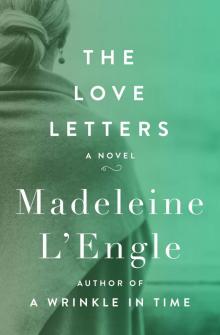 Love Letters
Love Letters The Summer of the Great-Grandmother
The Summer of the Great-Grandmother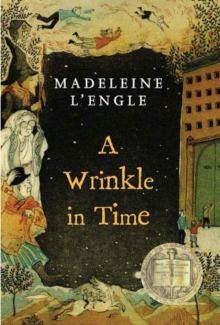 A Wrinkle in Time
A Wrinkle in Time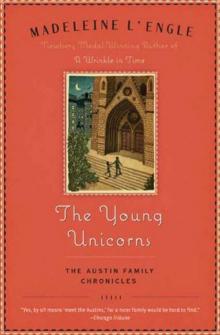 The Young Unicorns
The Young Unicorns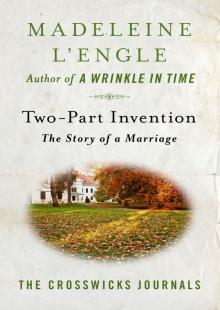 Two-Part Invention: The Story of a Marriage
Two-Part Invention: The Story of a Marriage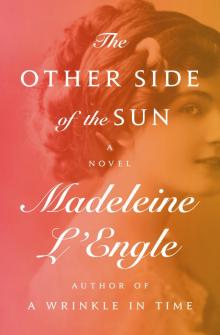 The Other Side of the Sun
The Other Side of the Sun A House Like a Lotus
A House Like a Lotus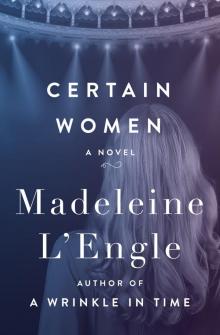 Certain Women
Certain Women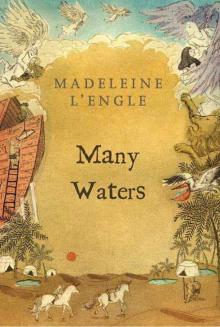 Many Waters
Many Waters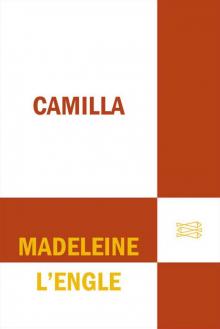 Camilla
Camilla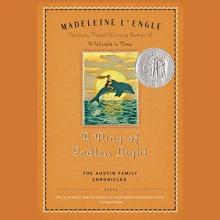 A Ring of Endless Light
A Ring of Endless Light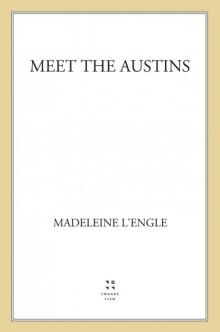 Meet the Austins
Meet the Austins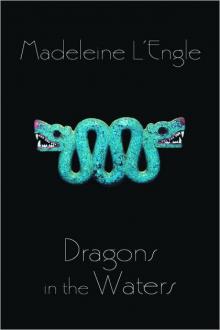 Dragons in the Waters
Dragons in the Waters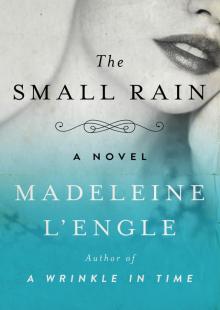 The Small Rain
The Small Rain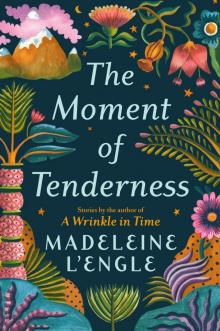 The Moment of Tenderness
The Moment of Tenderness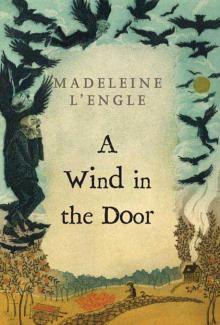 A Wind in the Door
A Wind in the Door Miracle on 10th Street
Miracle on 10th Street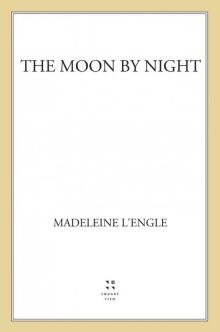 The Moon by Night
The Moon by Night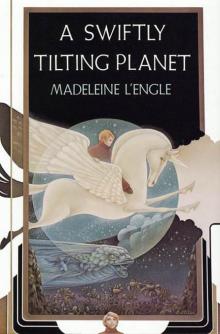 A Swiftly Tilting Planet
A Swiftly Tilting Planet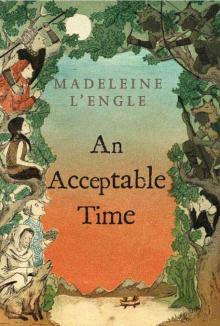 An Acceptable Time
An Acceptable Time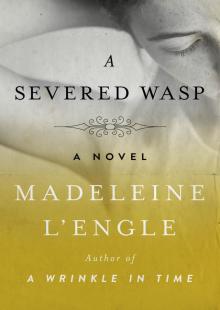 A Severed Wasp
A Severed Wasp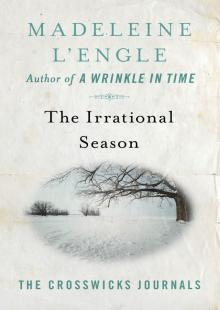 The Irrational Season
The Irrational Season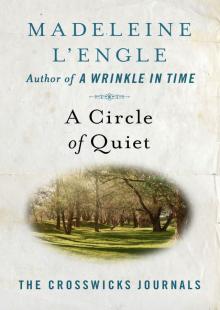 A Circle of Quiet
A Circle of Quiet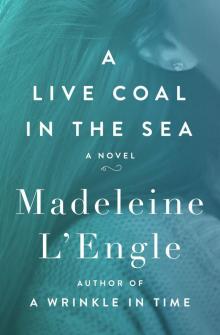 A Live Coal in the Sea
A Live Coal in the Sea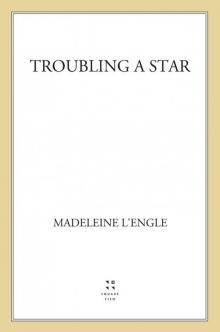 Troubling a Star
Troubling a Star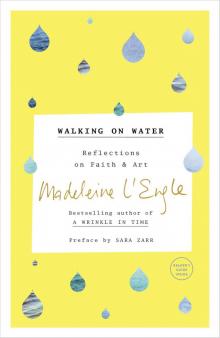 Walking on Water: Reflections on Faith and Art
Walking on Water: Reflections on Faith and Art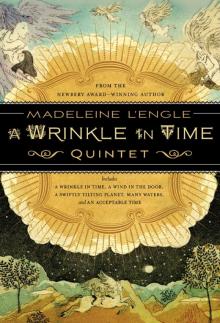 A Wrinkle in Time Quintet
A Wrinkle in Time Quintet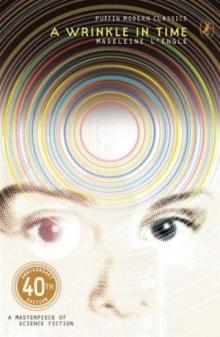 Wrinkle in Time
Wrinkle in Time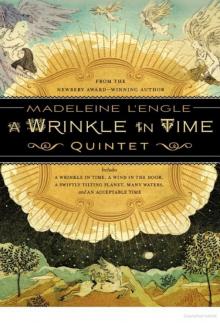 The Wrinkle in Time Quintet
The Wrinkle in Time Quintet Intergalactic P.S. 3
Intergalactic P.S. 3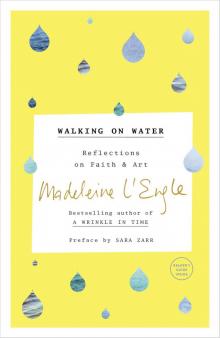 Walking on Water
Walking on Water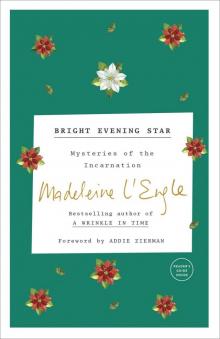 Bright Evening Star
Bright Evening Star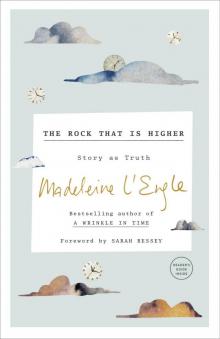 The Rock That Is Higher
The Rock That Is Higher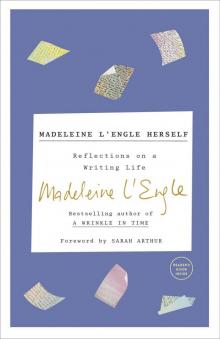 Madeleine L'Engle Herself
Madeleine L'Engle Herself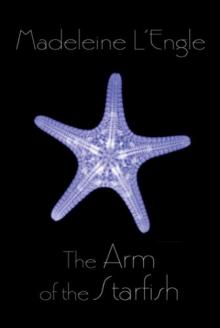 The Arm of the Starfish
The Arm of the Starfish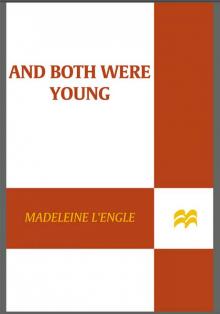 And Both Were Young
And Both Were Young The Twenty-four Days Before Christmas
The Twenty-four Days Before Christmas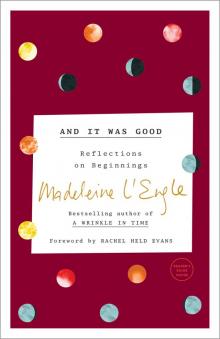 And It Was Good
And It Was Good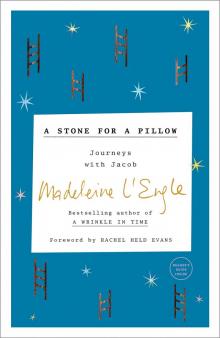 A Stone for a Pillow
A Stone for a Pillow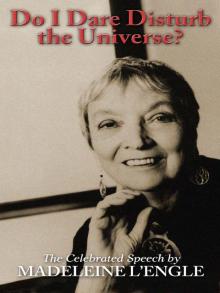 Do I Dare Disturb the Universe?
Do I Dare Disturb the Universe?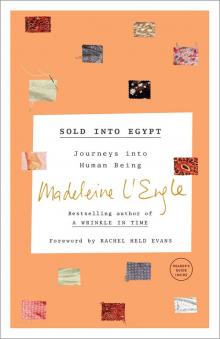 Sold into Egypt
Sold into Egypt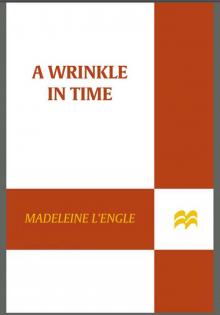 A Wrinkle in Time (Madeleine L'Engle's Time Quintet)
A Wrinkle in Time (Madeleine L'Engle's Time Quintet)